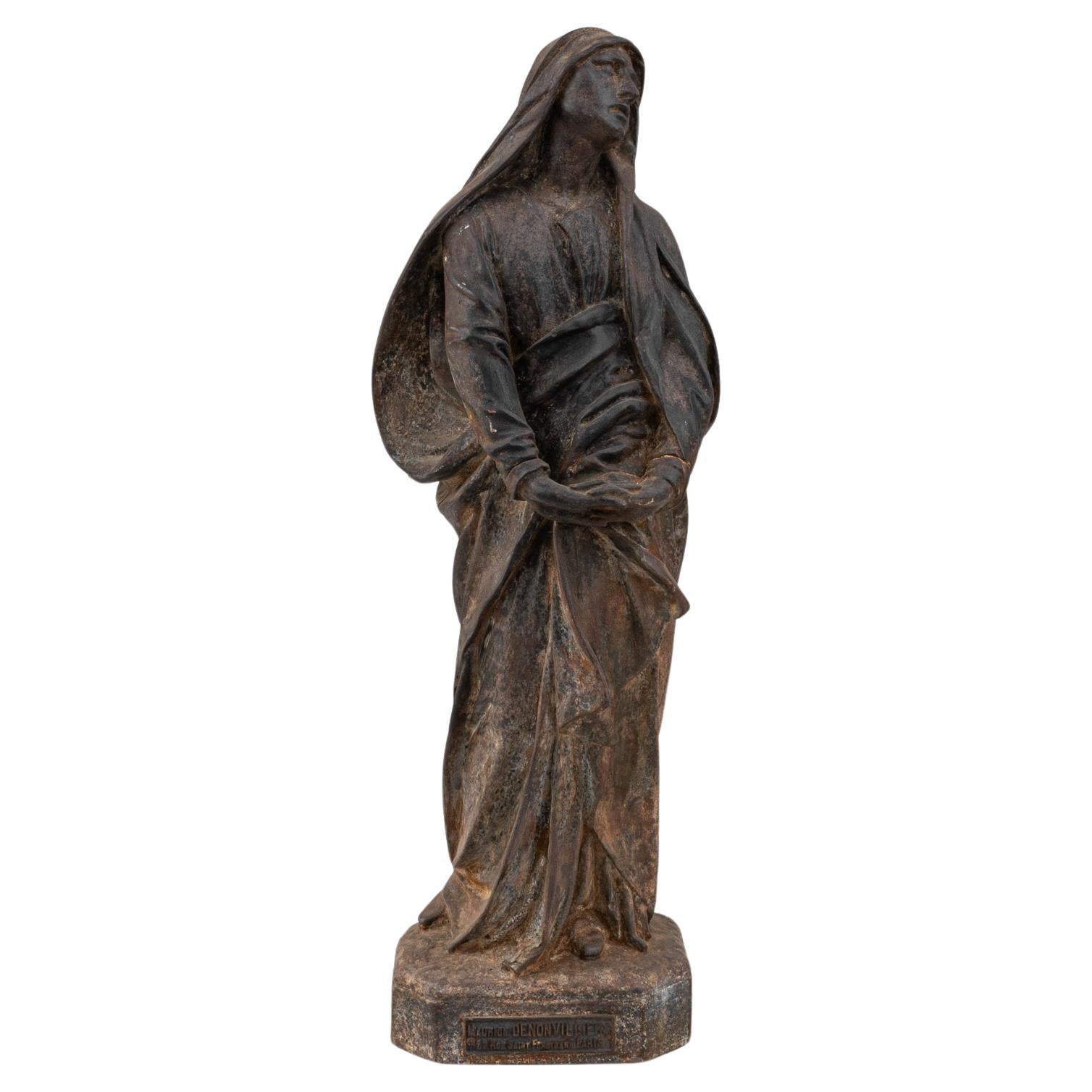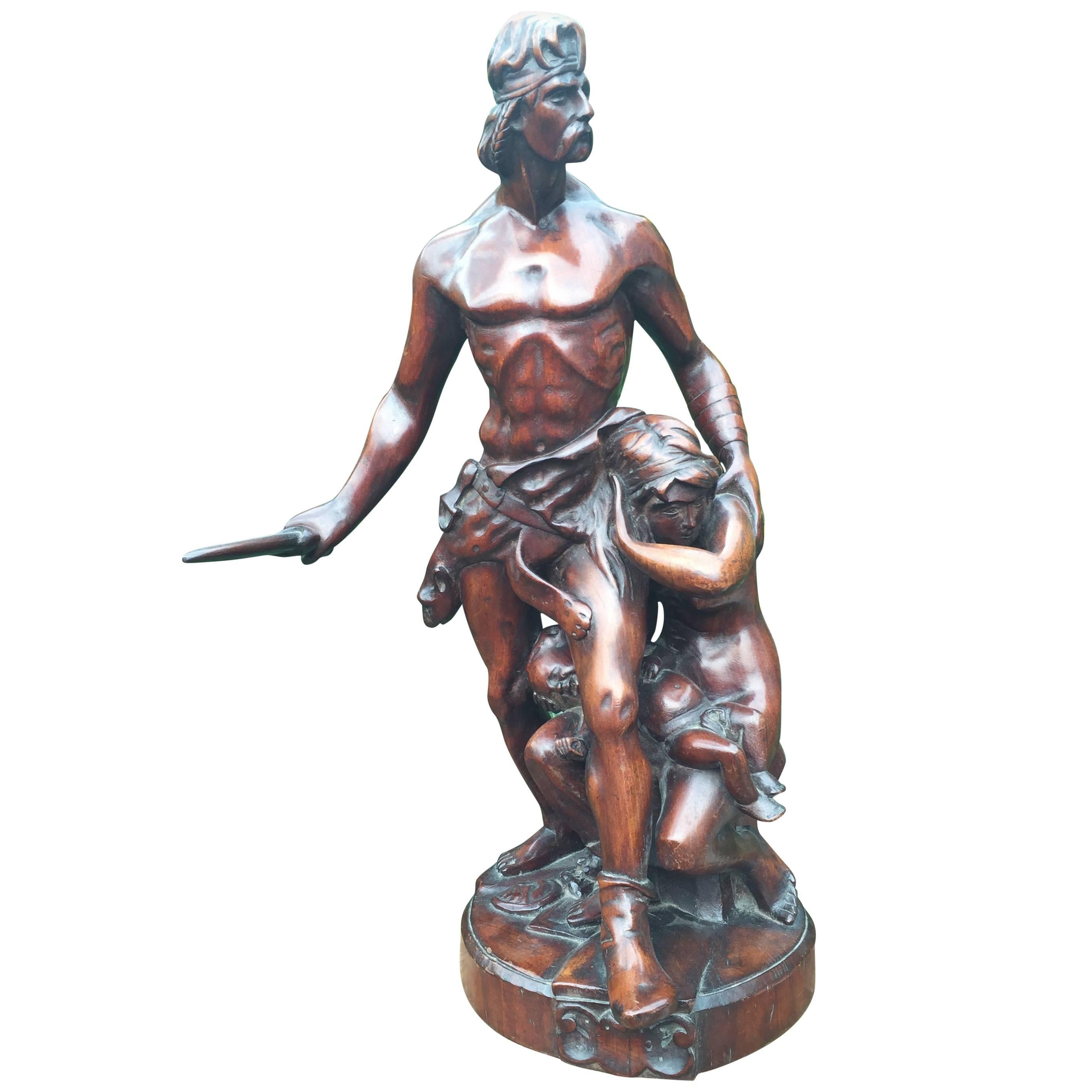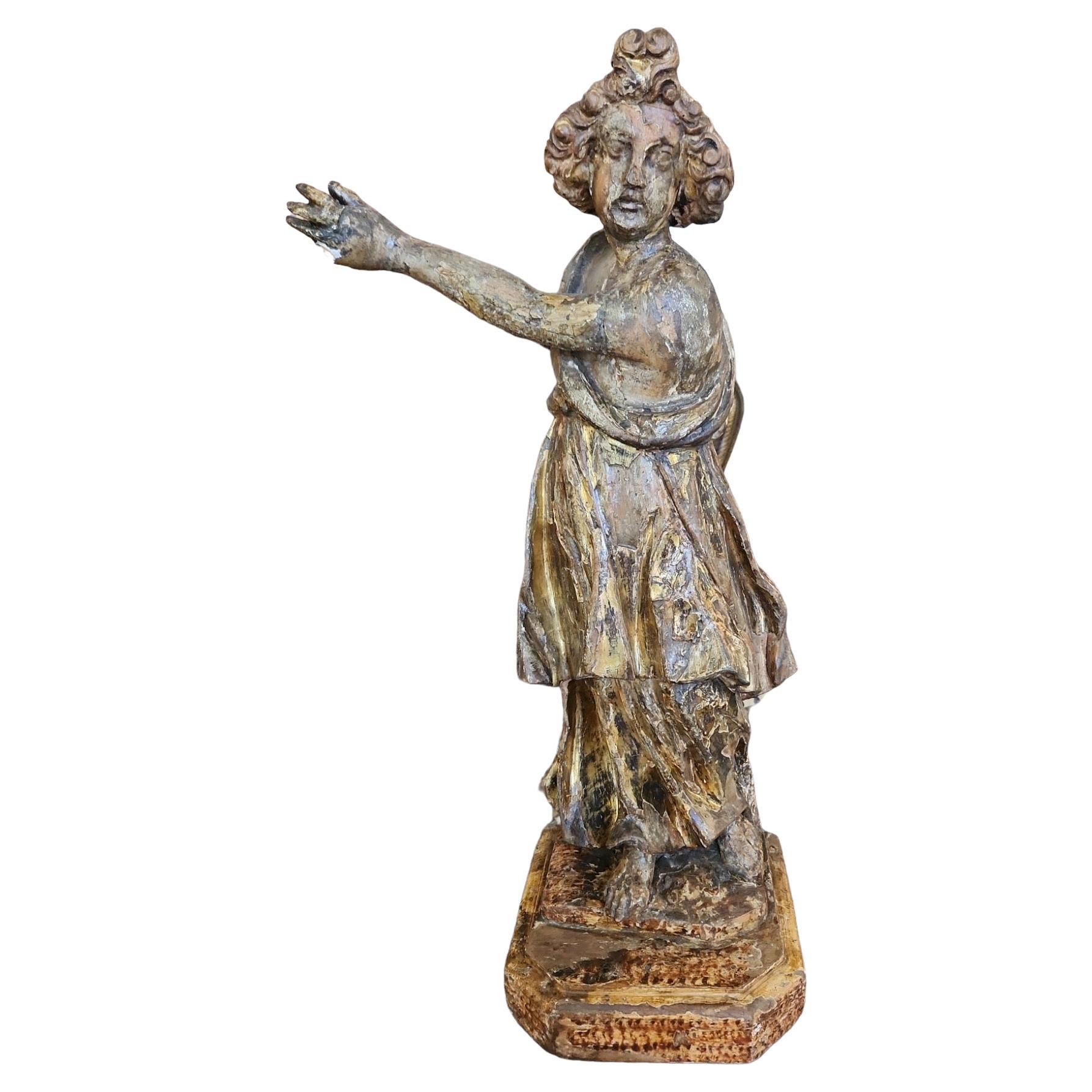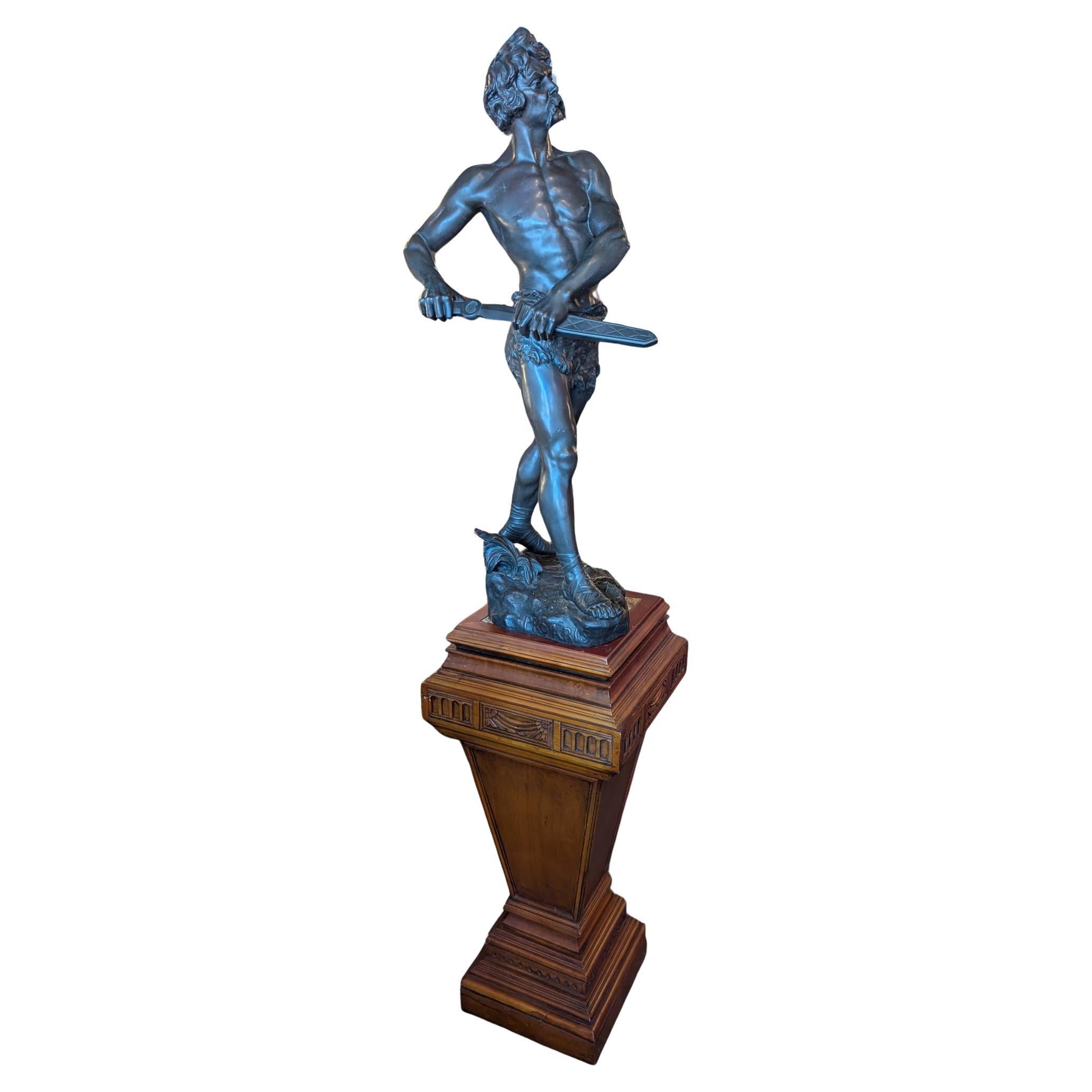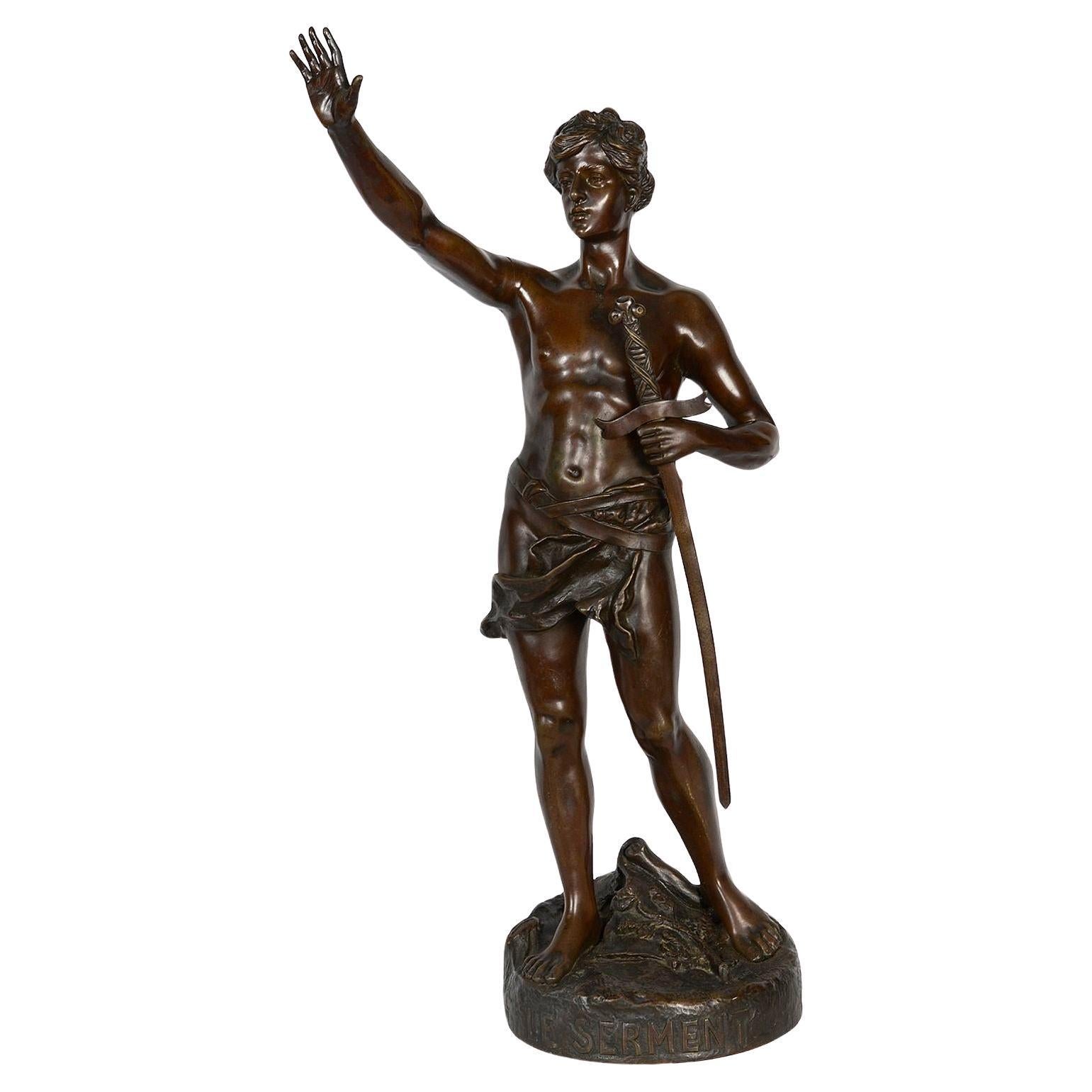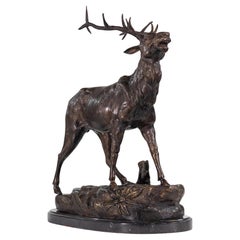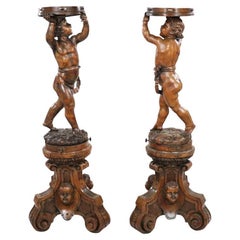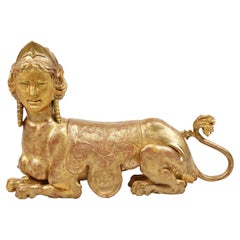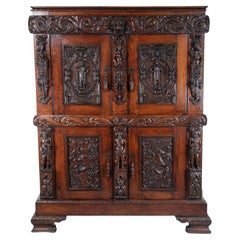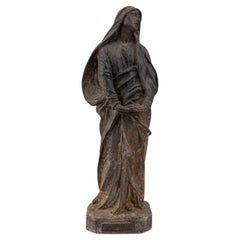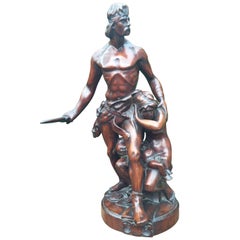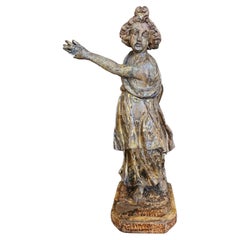Items Similar to Late 19th Century Live Size Renaissance Revival Italian Figural Carved Sculpture
Want more images or videos?
Request additional images or videos from the seller
1 of 21
Late 19th Century Live Size Renaissance Revival Italian Figural Carved Sculpture
$6,950
£5,229.23
€6,039.87
CA$9,822.16
A$10,658.55
CHF 5,648.09
MX$130,721.87
NOK 69,894.70
SEK 66,046.80
DKK 45,090.65
About the Item
This late 19th-century carved wooden sculpture is a lifesize depiction of a young nobleman of the Italian Renaissance. The piece is made entirely from wood and carved gesso under an ebonized finish, giving it the illusion of an oxidized bronze sculpture. The young man is posed in a classic Contrapposto stance, which is an Italian term that means "counterpoise". This term usually refers to a standing human figure carrying its weight on one leg so that the opposite hip rises to produce a relaxed curve in the body, a dynamic pose that is most associated with Renaissance art. He establishes his stance with a hand on his large belt and one hand in the air holding a torch. This Renaissance revival piece is highly detailed through intricate workmanship, down to the Lion of Saint Mark on the young boy's chest.
The Lion of Saint Mark, representing Saint Mark the patron saint of Venice, was typically represented as a winged lion with a halo holding onto a bible. This representation refers to Mark's description of John the Baptist as "...The voice of the one who cries in the wilderness: Prepare Ye the way of the Lord, make straight his paths", which artists compared to a roaring lion. This emblem is a symbol of the city of Venice and is prominently featured in Venetian iconography and heraldry.
This statue is a beautiful rendering and revival of a Renaissance figure. The top of the young man's torch was left as is but could be used to prop up a plant with long vines or rewired to hold a flame glass shade as a lamp. This gorgeous sculpture would be a true statement for any home, inviting its viewer to get lost in the details.
Overall H=94 in. W=25 in. D=23 in. 140 lbs.
Sculpture: H=73 in. D=16 in. W=25 in. 80 lbs.
Base: H=21 in. W=23 in. D=23 in. 50 lbs.
- Dimensions:Height: 94 in (238.76 cm)Width: 25 in (63.5 cm)Depth: 23 in (58.42 cm)
- Style:Renaissance Revival (Of the Period)
- Materials and Techniques:
- Place of Origin:
- Period:
- Date of Manufacture:Unknown
- Condition:Wear consistent with age and use. Wear to the plaster under the ebonized finish caused by wood separation. Cracks, chips, and nicks all around. Has professional repairs to the belt and the base. The bottom of the base has later wooden braces. The figure separates for transport.
- Seller Location:Chicago, IL
- Reference Number:1stDibs: LU7185242043882
About the Seller
5.0
Gold Seller
Premium sellers maintaining a 4.3+ rating and 24-hour response times
Established in 1964
1stDibs seller since 2022
32 sales on 1stDibs
Typical response time: 1 hour
- ShippingRetrieving quote...Shipping from: Chicago, IL
- Return Policy
Authenticity Guarantee
In the unlikely event there’s an issue with an item’s authenticity, contact us within 1 year for a full refund. DetailsMoney-Back Guarantee
If your item is not as described, is damaged in transit, or does not arrive, contact us within 7 days for a full refund. Details24-Hour Cancellation
You have a 24-hour grace period in which to reconsider your purchase, with no questions asked.Vetted Professional Sellers
Our world-class sellers must adhere to strict standards for service and quality, maintaining the integrity of our listings.Price-Match Guarantee
If you find that a seller listed the same item for a lower price elsewhere, we’ll match it.Trusted Global Delivery
Our best-in-class carrier network provides specialized shipping options worldwide, including custom delivery.More From This Seller
View AllLate 19th Century American Bronze Sculpture Wild Stag on Marble Plinth
Located in Chicago, IL
This late 19th-century bronze sculpture depicts a wild stag in mid-call, standing on a textured base that evokes natural elements. The piece showcases intricate detailing with except...
Category
Antique Late 19th Century American Victorian Animal Sculptures
Materials
Marble, Bronze
Pair of 19th Century Italian Carved Wood Figures of Cherubs/Putti
Located in Chicago, IL
Meticulously carved from beechwood, this cherub pair recalls the iconic Renaissance style of the fifteenth and sixteenth centuries. Better recognized by their Italian name, putti—the singular putto refers to the Latin putus, meaning “boy” or “child”—these types of figures often recur in religious artwork as symbols of God...
Category
Early 20th Century Italian Renaissance Figurative Sculptures
Materials
Beech
Early 19th Century English Regency Greek Revival Gilt Carving of a Sphinx
Located in Chicago, IL
From the 1700s through the early 1800s, European aristocrats developed a fascination with ancient Egyptian culture and design that culminated in a full Egyptian Revival. Prominent figures such as Marie Antoinette and Napoleon Bonaparte commissioned rooms decorated with Egyptian motifs. This cultural moment reflects a fascination with a sophisticated civilization of great artists and pharaohs. The Regency era possessed very little knowledge of the Great Pyramids or hieroglyphics, a quality that lent Egyptian art interpretation a compelling air of mystique.
This English Regency period gilt carving depicts a popular figure of borrowed Egyptian motif: the Sphinx. Recognized among educated circles as a symbol of brilliance in the ancient past, the Sphinx was well-known as a mythological creature who destroys those who failed to answer her riddle. Such a piece as this, excellent in detail and craftsmanship, may have once graced the mantle of a gentleman’s study or been exchanged as a gift between British scholars. The beautiful gold surface has been achieved by an artful combination of gilt and gesso; the art enthusiast will appreciate the intricate texture realized in the carving’s hair and tail as well as the delicate detailing of the saddle.
Borrowing from the Egyptians, the Greeks had their own interpretation of the Sphinx. Greek mythology chronicled the Sphinx as being the daughter of Orthous and Chimera or Laius and attributed the riddles, which she proposed, as having been taught to her by the Muses. Crowned with a Grecian diadem and having a refined expression, she evokes an ancient yet reserved intellect.
For the modern-day enthusiast of classical Greek art...
Category
Antique Early 19th Century English Regency Figurative Sculptures
Materials
Gold Leaf
19th Century French Renaissance Revival Cabinet with Ornamental Figural Carvings
Located in Chicago, IL
This Mid-19th Century French Renaissance Revival oak cabinet showcases a sophisticated combination of two distinct varieties of solid oak, each sourced from different parts of the tr...
Category
Antique Mid-19th Century French Renaissance Revival Wardrobes and Armoires
Materials
Oak
Early 20th Century French Neoclassical Black Slate and Marble Mantel Clock
Located in Chicago, IL
This Circa 1900 French Black Slate and Marble Mantel Clock is a formidable and visually stunning timepiece that commands attention. Atop the clock sits a large, patinated bronze lion...
Category
Early 20th Century French Neoclassical Table Clocks and Desk Clocks
Materials
Marble, Slate, Brass
Mid 19th Century French Bronze Grand Tour Vase Signed by Achille Collas
By F. Barbedienne Foundry, Achille Collas
Located in Chicago, IL
This exquisite 19th-century patinated bronze vase, crafted by the esteemed Ferdinand Barbedienne foundry, beautifully demonstrates the innovative reduction technique developed by Ach...
Category
Antique Mid-19th Century French Neoclassical Vases
Materials
Bronze
You May Also Like
19th Century French Cast Iron Sculpture
Located in High Point, NC
This evocative 19th Century French Cast Iron Sculpture captures the profound emotion and exquisite detail synonymous with the era's artistry...
Category
Antique 19th Century French Figurative Sculptures
Materials
Iron
One of a Kind Antique Carved Wood Group Statue Sculpture by Emile Boisseau
Located in Lisse, NL
Unique 19th century French wooden sculpture.
This large and figural group is titled 'La Defense Du Foyer' which translates as 'the protection of the spous.' This impressive sculpture is in good and original condition and this ripped hunter defenitely looks ready to fight off anyone or anything threatening his spous.
This sculpture is attributed to Emile Andre...
Category
Antique Late 19th Century French Neoclassical Figurative Sculptures
Materials
Wood
18th Century Italian Carved Figure
Located in Los Angeles, CA
In excellent condition considering his age. She is very beautiful. From a significant home in Santa Barbara. Base is 9.5" x 10".
Category
Antique 18th Century Italian Neoclassical Figurative Sculptures
Materials
Wood, Giltwood
French Henri Fugere Bronze Statue
Located in Pueblo, CO
Fabulous French Bronze by Henri Fugere, Pro Aris Et Focis, Sussee Freres and Houdebine Co. 1872-1944 featuring a Gaul Warrior wearing loin cloth and sandals, drawing a sword. Beaut...
Category
Early 20th Century French Neoclassical Revival Figurative Sculptures
Materials
Bronze
19th Century Bronze statue ' Le Serment' by Oscar Ruffony.
By Ruffony
Located in Brighton, Sussex
A good quality late 19th century patinated bronze statue of a classical young semi clad swordsman, titled ' The Oath'.
Signed to the base O. Ruffony
Oscar Ruffoni, whose artist name ...
Category
Antique Late 19th Century French Classical Greek Abstract Sculptures
Materials
Bronze
Cast Iron Mercury Statue
Located in MARSEILLE, FR
Representation of Mercury in cast iron on a wooden base: Mercury (Roman God) or Hermes (Greek God), the messenger god of the other gods is recognizable here thanks to the caduceus he...
Category
Antique 18th Century European Greco Roman Figurative Sculptures
Materials
Iron
$2,035
More Ways To Browse
Italian Renaissance Revival
Renaissance Wood Carved
Oxidized Bronze
Antique Props
Hands Belt
Flame Shade
Flame Glass Shade
Hand Holding Torch
Venetian Statue
Ebony Wood Carving
Edouard Drouot Bronze
Egyptian Grand Tour
Female Sphinx
Fisherman Bronze Sculpture
Glass Blown Decorative Fruit
Greek Bronze Figure
Greek Torso
H Moreau
